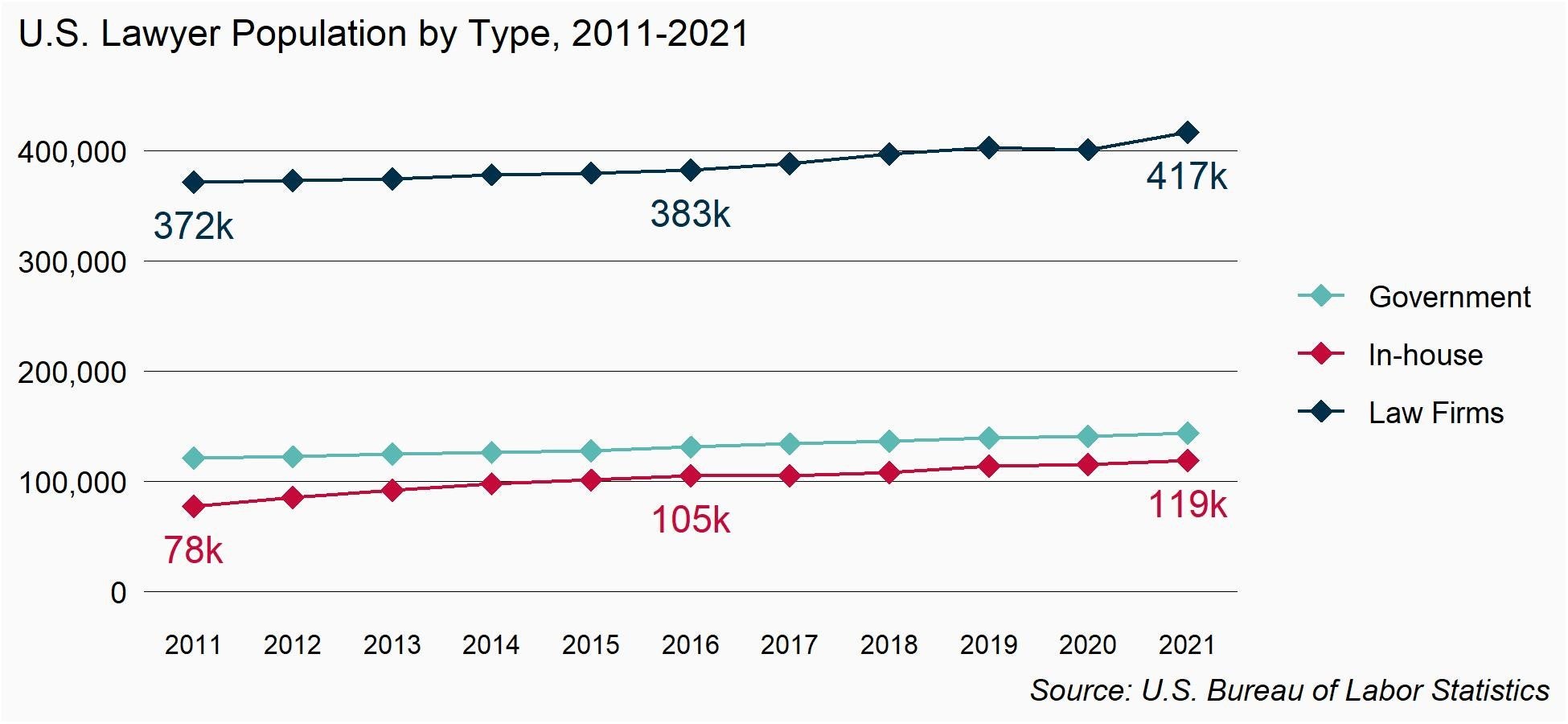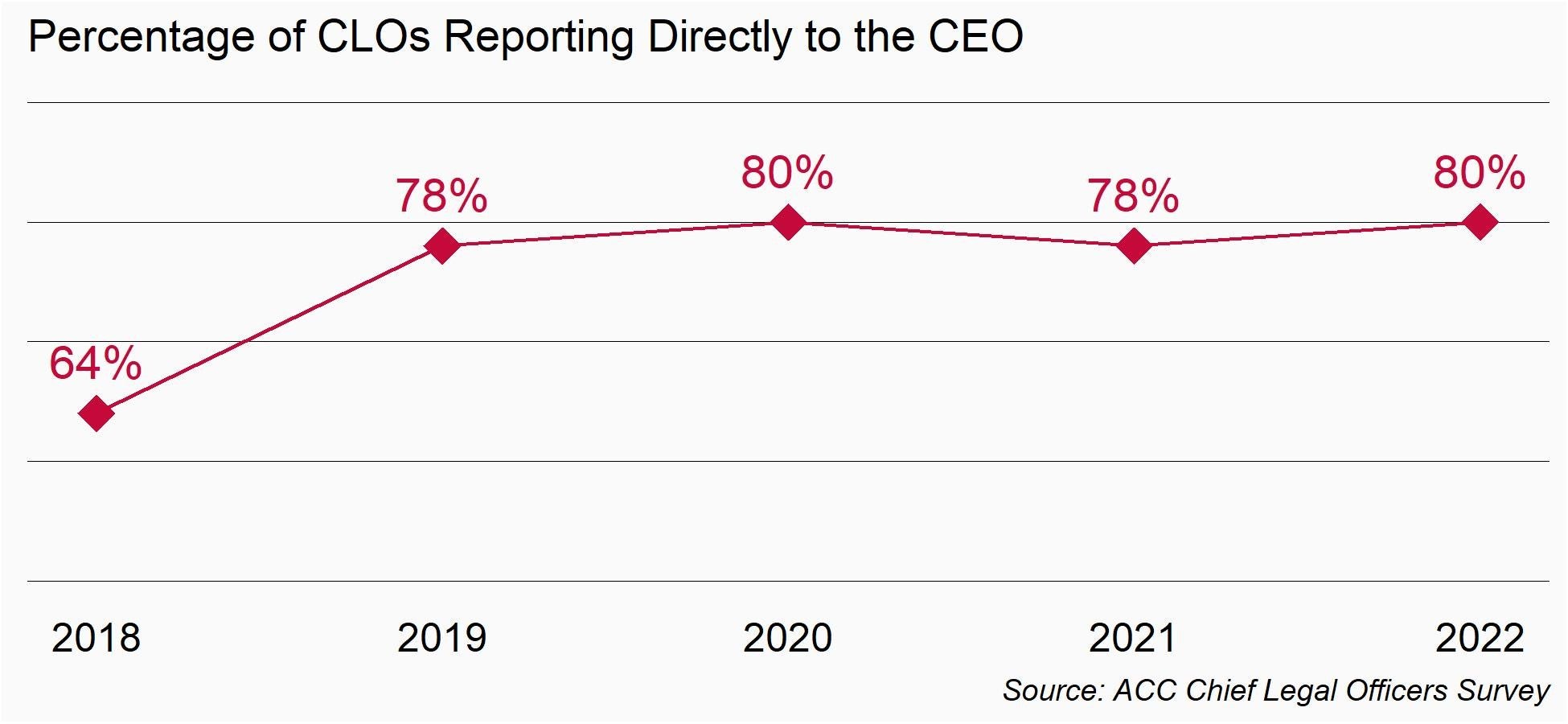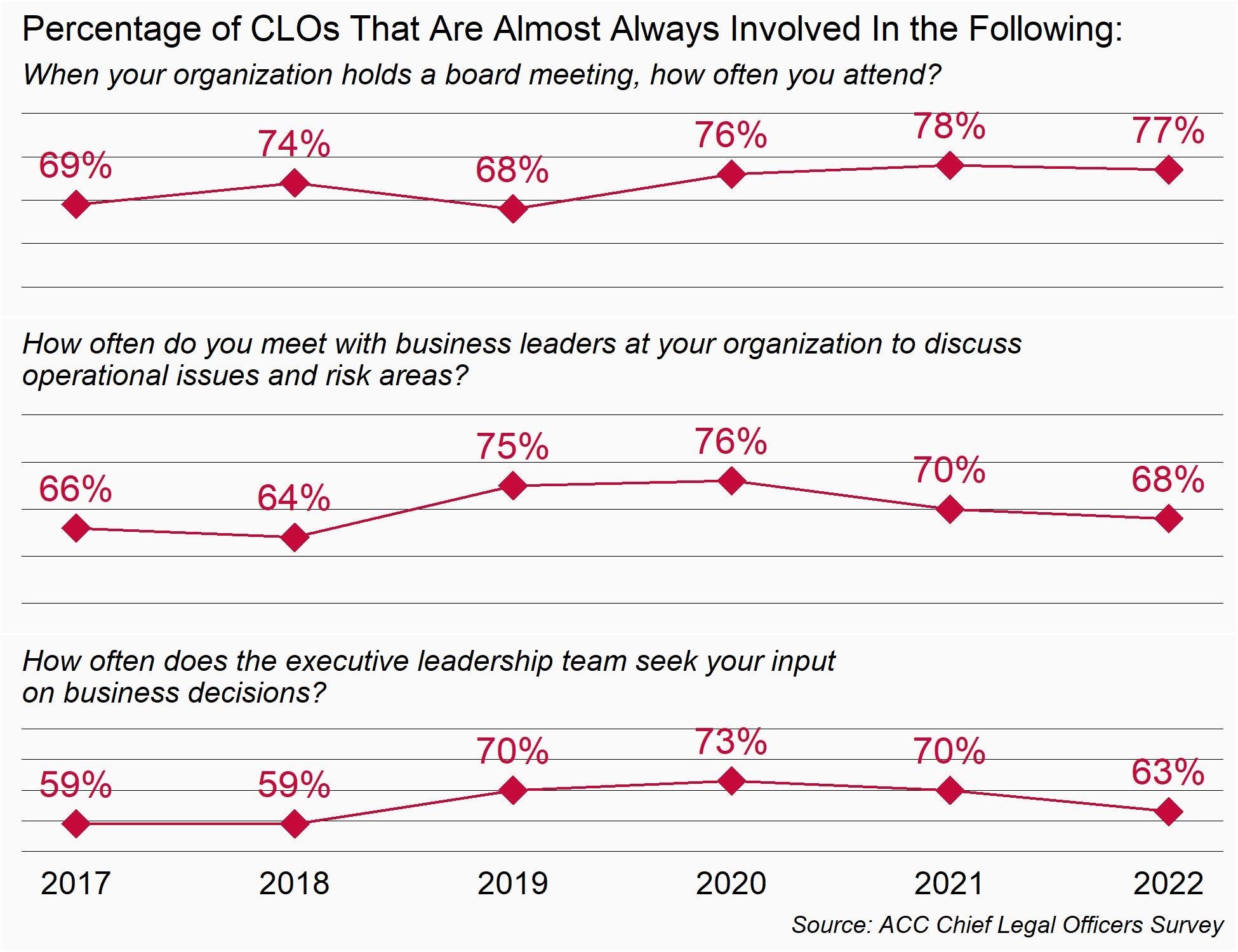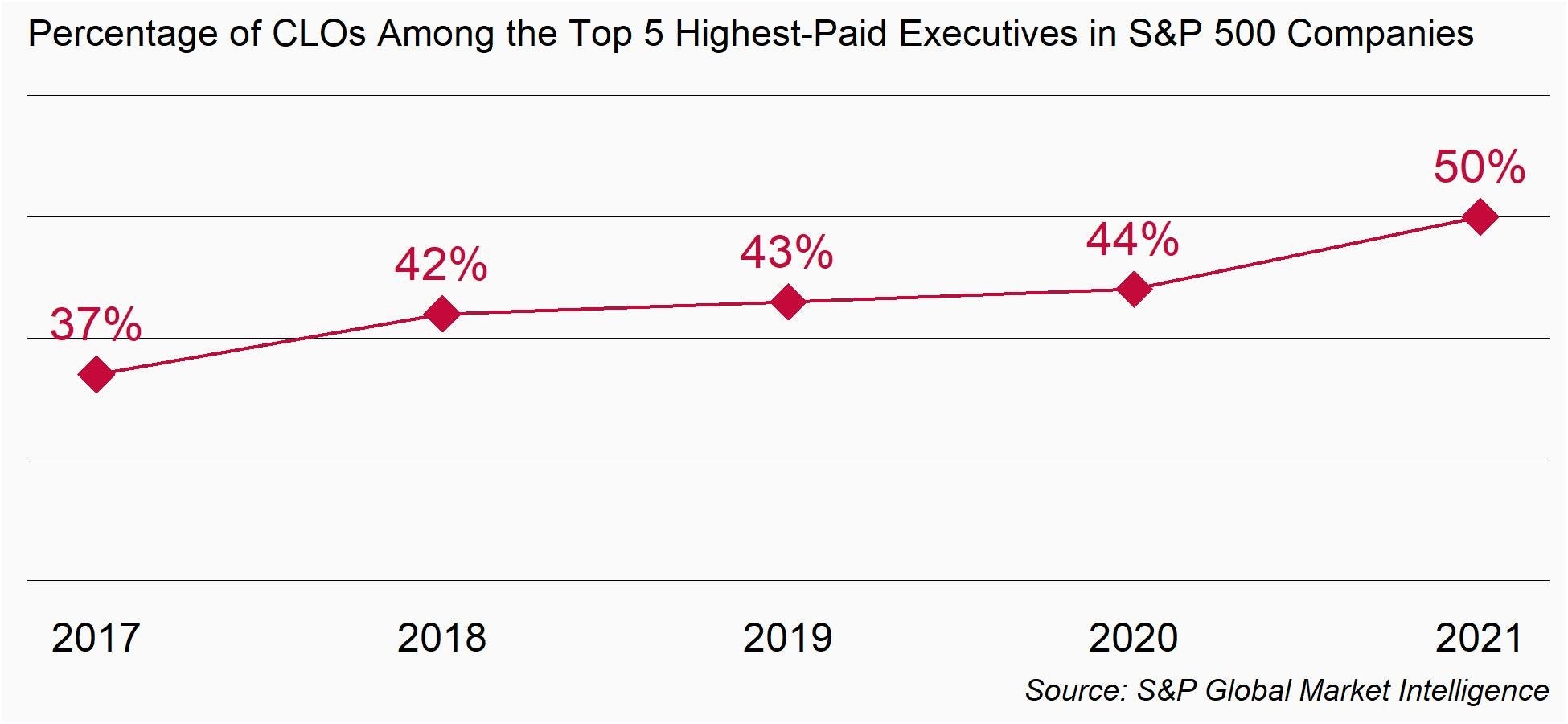ImageFlow / Shutterstock.com
In-house legal departments must constantly adapt to better serve the business in a changing environment that involves operating in a globalized and uncertain world, an increased digitization of business processes, and handling risk and compliance obligations across multiple jurisdictions and operational areas. Along with changing demands and business needs for the legal department, the role of the chief legal officer (CLO) has to follow suit and react to an ever-evolving environment.
This need for adaptation is based on two factors:
- First, the in-house legal profession is growing, with more companies establishing a legal department and the number of in-house professionals increasing steadily, which requires CLOs to lead larger teams that manage more work related to contracts, litigation, and risk, among other areas.
... The in-house legal profession is growing, with more companies establishing a legal department and the number of in-house professionals increasing steadily ... .
In the United States, for example, the number of in-house counsel has increased by 54 percent in the last decade (2011-2021), based on data from the US Bureau of Labor Statistics. To put this significant increase in perspective, the number of lawyers employed at law firms only increased by 12 percent in the same period, and the number of government lawyers did so by 19 percent.

- Second, CLOs are performing as more than lawyers and have wider influence on corporate governance and strategy. The annual ACC Chief Legal Officers Survey monitors different aspects of the role and reach of CLOs, and their responsibilities beyond their position as leaders of the corporate legal department.
... CLOs are performing as more than lawyers and have wider influence on corporate governance and strategy.
Each year, the CLO Survey includes insights from hundreds of CLOs and general counsel from companies worldwide, representing an array of sizes and industry sectors. In this article, we present key findings from the 2022 ACC Chief Legal Officers Survey and other sources that show how the CLO’s role is expanding and adapting to ever-changing business needs.
Most CLOs now have a seat at the table
The CLO Survey tracks the percentage of CLOs that report directly to the CEO in their organizations. This is one important indicator to estimate the influence that the CLO has on the business. By reporting directly to the company’s top executive, CLOs not only provide direct influence on legal- and compliance-related matters to the company’s leadership, but are also more attuned to the strategic and operational decisions of the business, and can influence those, too. Having a seat at the table is paramount to incorporating the legal department’s key input in the company’s general management.
... A solid majority of participants in the CLO Survey across all company sizes report directly to the top company executive.
The percentage of CLOs that report to the CEO has remained stable at around 80 percent since 2019, a substantial increase compared to 64 percent in 2018. This consistency in the recent results suggests that the CLO reporting directly to the CEO is now the norm, and a solid majority of participants in the CLO Survey across all company sizes report directly to the top company executive. The minority of CLOs that do not report directly to the CEO often instead report to the chief financial officer.

More than a lawyer
The CLO Survey also measures the influence of the CLO on the business in several other ways. According to participants, CLOs spend, on average, more than one-third of their time dedicated to tasks not strictly related to legal matters, including contributing to developing business strategy (13 percent), board matters and governance (12 percent), and advising executives on non-legal issues (11 percent). CLOs often stress in open-ended questions that the role is often more about being a business leader than a legal advisor.
Most CLOs are deeply involved in corporate governance, strategic planning, and providing business advice. The CLO Survey tracks the percentage of participants that “almost always” attend board meetings, meet with business leaders to discuss operational issues and risk areas, and are consulted by executive leadership on business decisions. More than three-quarters of CLOs normally attend board meetings, showing a clearly upward trend since 2017. According to the 2022 survey results, 68 percent regularly meet with business leaders and 63 percent provide input on business decisions. While these results were slightly higher in the 2019-2021 period, the trend since 2017 is positive and far above the halfway mark.

CLOs in large companies with US$10 billion or more in annual revenue are even more engaged in corporate governance, with 83 percent almost always attending board meetings and more than 70 percent regularly meeting with business leaders to discuss operational issues and advising on business decisions.
The CLO’s role is growing beyond legal
The expanding influence of the CLO in the business is also changing the scope of the role. CLOs are overseeing more business areas outside of the legal department, with 80 percent handling the compliance function, practically half also overseeing ethics and privacy, 40 percent supervising risk management, and around one-quarter managing corporate government affairs and environmental, social, and governance (ESG) and corporate social responsibility (CSR). The latter, in particular, is an area that has grown considerably as part of the CLO’s responsibilities in the last couple of years, with 24 percent of CLOs overseeing ESG and CSR compared to just 15 percent in 2020.
Participants point out that key skills needed to succeed in a more fluid role involve communication skills, executive leadership, and being open and eager to constantly learn more about the business as the CLO role expands.
Our data thus hints at CLOs expanding their reach and imprint on several areas of the business beyond legal, which requires adaptation to new functions and enhancing a more diverse skillset. Participants point out that key skills needed to succeed in a more fluid role involve communication skills, executive leadership, and being open and eager to constantly learn more about the business as the CLO role expands.
CLOs are becoming key business leaders
The growing influence of CLOs on the overall business is supported by more areas than our survey findings on their involvement in business decision-making and greater oversight over other business functions. We are also observing that CLOs are steadily becoming a key C-suite member in the largest corporations. (ACC monitors the percentage of CLOs that are among the top-five highest-compensated executives in the companies that constitute the US S&P 500 index.)
The trend is clearly growing since 2017, when 37 percent of S&P 500 organizations listed their CLO among their five highest-compensated individuals. This percentage progressively increased to the lower forties between 2018 and 2020, and reached 50 percent for fiscal year 2021. This upward trend indicates that the CLO is becoming a critical member of the executive leadership team in larger organizations along the likes of chief financial officers and chief operating officers.

Participate in the ACC 2023 Chief Legal Officers Survey
The ACC 2023 Chief Legal Officers Survey is open for participation to CLOs globally. We very much welcome the input from participants who are the highest-ranked lawyers in their organizations and encourage all eligible CLOs to participate. Your involvement continues to help us shed light on the growing role of the CLO and how legal contributes to businesses being more efficient, responsible, and ultimately successful.
Aside from the role and reach of the CLO, the survey also explores the legal department’s value to the business, the political and regulatory landscape, and the upcoming challenges that CLOs are facing.
The deadline to participate is Oct. 28, 2022, and those who participate will receive a detailed breakdown of the results by company size. The full survey results will be published in January 2023.
Disclaimer: The information in any resource in this website should not be construed as legal advice or as a legal opinion on specific facts, and should not be considered representing the views of its authors, its sponsors, and/or ACC. These resources are not intended as a definitive statement on the subject addressed. Rather, they are intended to serve as a tool providing practical guidance and references for the busy in-house practitioner and other readers.




